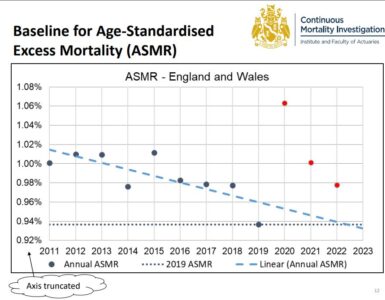Throughout the pandemic we have discussed and compared the epidemics arising in two of the countries where our team are based: the UK and South Africa. This has provided opportunities to compare and learn. In May 2020, we examined the difficult decisions each country faced. Back then South Africa had around 100 COVID-deaths and the UK was already close to 25,000. Later we summarised the variants (now called Alpha and Beta) that had been identified in both countries. Beta went on to drive a devastating second wave in South Africa.
The third wave in the UK
The UK has high vaccination rates and was on a roadmap to returning to normal when cases started rising. The growth in infections is being driven by the Delta variant. Cases in the England have exceeded 10,000 per day and hospital admissions are rising. Deaths, though also rising, show a much slower increase and remain at low absolute levels. The increase in infections has resulted in a delay to step 4 of the roadmap.
The third wave in South Africa
The situation in South Africa is somewhat different. Cases have been rising since early April. Cases started rising on Northern Cape and Free State, later reaching Gauteng (the most populated province). Cases have already exceeded the peak of the first wave and seem likely to exceed the second wave. Cases are just below 15,000 per day and still rising, though the rate of growth has slowed slightly in the last week. R is currently between 1.1 and 1.2.
Only 2.7m people have been vaccinated in South Africa – less than 5% of the population – and most of those have had just one dose. This means that, unlike the UK, this wave is resulting in a surge in admissions. In Gauteng there are nearly 10,000 cases per day: hospitals are struggling to cope and are filling up. Reported COVID-deaths are rising, but in South Africa, as discussed in an earlier bulletin, the most accurate measure of the impact of the pandemic is excess deaths. Reported deaths understate the true picture.
Latest data indicates over 3,000 excess deaths per week. In Gauteng excess deaths have risen sharply and stand at over 1,300 per week.
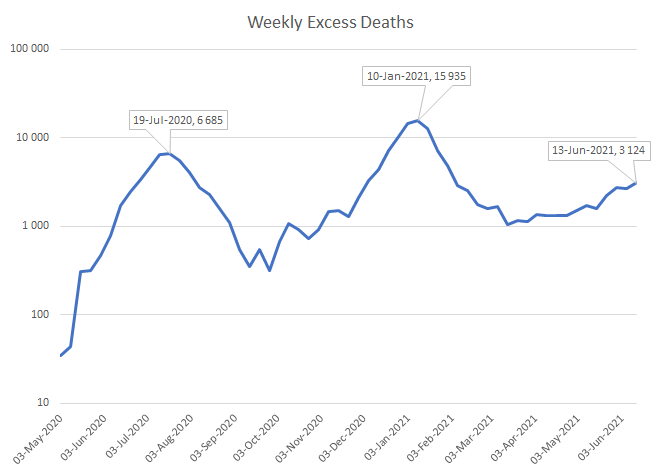
Delta Variant
On Saturday, a briefing hosted by the Department of Health confirmed that they have sequenced an increased proportion of Delta genomes in South Africa. Before this Delta had mostly been sequenced in travellers or even on ships in harbour.
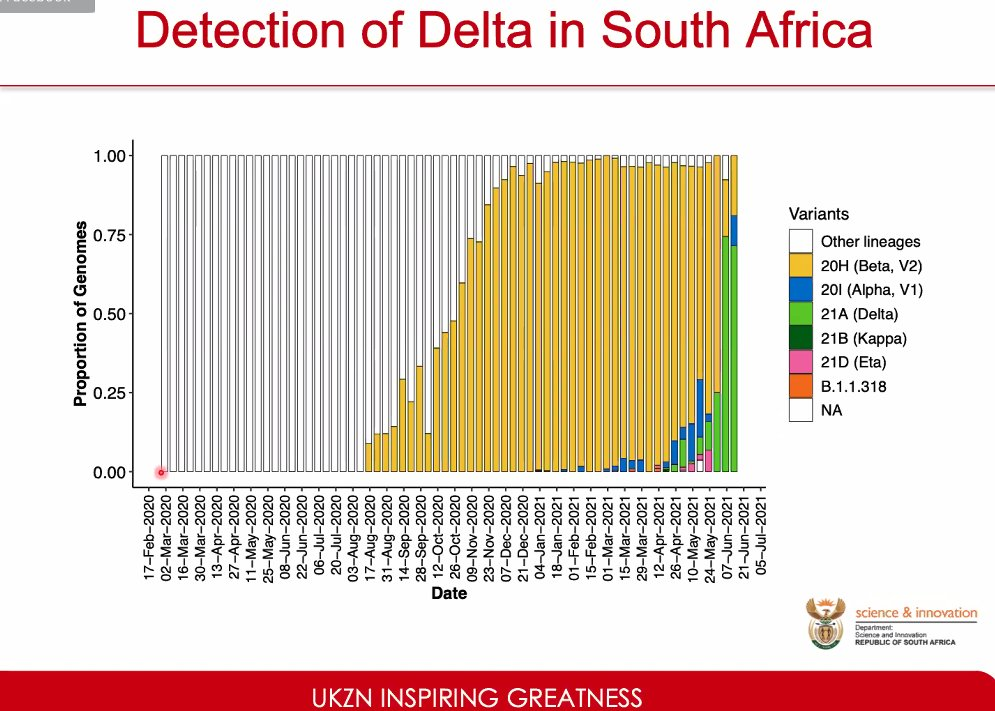
It appears that Delta has rapidly become dominant across South Africa, although more recent sequences relate mainly to KwaZulu-Natal province. With a large Indian community in that province it may be that Delta started spreading there first, seeded by those returning from India. It’s possible that recent sequences from other parts of South Africa may have lower frequency of Delta. So perhaps growth is not as rapid as it appears, but even so it is concerning.
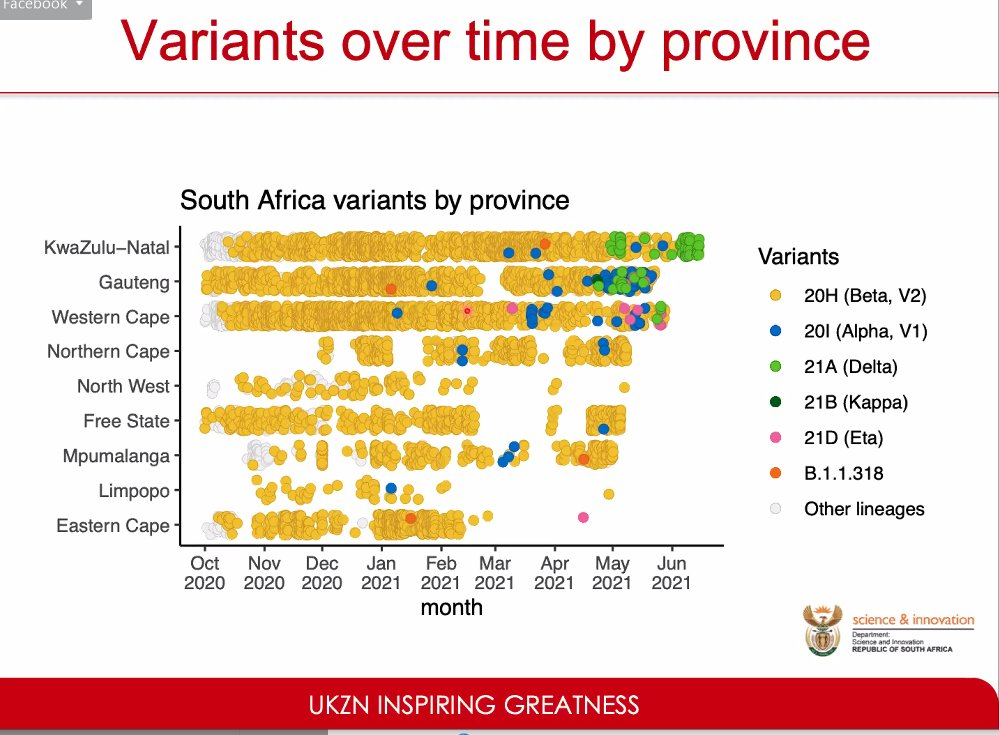
Even though Gauteng shows low numbers of Delta variant sequences on the above chart it is thought to be spreading there – this was evidenced by Delta being found in passengers arriving in Shenzen, China from Johannesburg.
What is known about the Delta variant is concerning:
- It has higher transmissibility.
- It also has indications that it may be more severe. Public Health England cite double the hospitalisation risk for this variant.
- Vaccines are effective against the variant, though a single dose is not optimal.
Seroprevalence based on blood donor samples (Update)
After this blog was posted seroprevalence estimates based on blood donor samples were released. The degree to which these represent the general population is unclear but, given the severity of the epidemic in South Africa up until May there was hope that a higher proportion of people have already been infected.
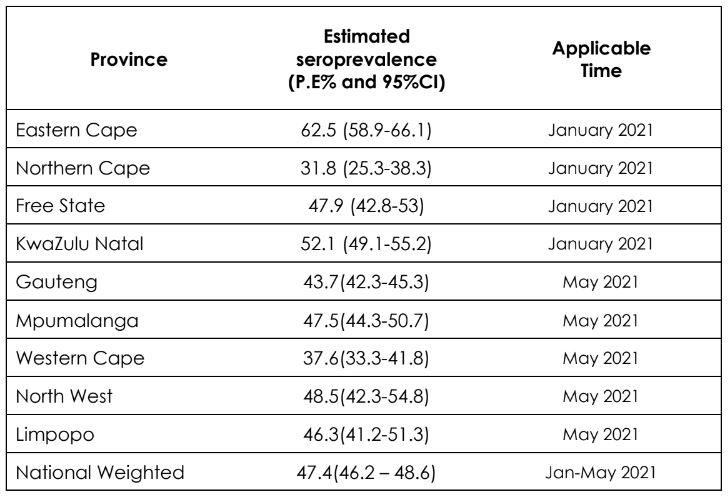
A perfect storm in South Africa?
It appears that South Africa is in a very bad situation:
- Vaccine rollout is minimal and mostly just the first dose.
- South Africa has entered a severe third wave.
- A highly transmissible and more severe variant has started spreading.
- Seroprevalence may be lower than had been assumed.
South Africa is likely to be facing a third wave even more severe than the first two.
Back in May 2020 we shared a projection by Imperial College London which included a unmitigated scenario projected to result in 216,000 deaths in South Africa (the worst scenario in that projection). With 173,000 excess deaths already we may well exceed that figure before the end of the year.
Lessons
There is a lesson for South Africa. More caution could have been applied, assuming a more transmissible variant would arrive and could result in a more severe third wave. In a recent blog, Josephine Robertson discussed how countries can respond to new variants. Earlier and localised responses in Northern Cape and Free State might have delayed this wave allowing more vaccines to be rolled out. This may have avoided or delayed the harsher Level 4 restrictions put in place recently to try and slow down the rise in cases.
The lack of vaccines is more difficult to address. Though South Africa likely could have done better at securing vaccines, the developed world also needs to think about how a more equitable distribution can be achieved. The COVAX facility is struggling obtain vaccines so we risk the South African story soon being repeated in other African countries with less resources. India provides a tragic warning of what may result.
To address this South Africa and the World Health Organisation (WHO) have started a technology transfer hub to enable African companies to study mRNA technology, enabling production of vaccines for COVID-19 and other diseases locally. This may allow us to get ahead of the next curve but it is too late for the one that is here now.
In the above article, Michael Ryan of the WHO talks about a short window of opportunity to get vaccines to vulnerable people in low income countries before a more severe variant emerges, and that only way to achieve this is for surplus vaccines to be distributed from rich countries to the vulnerable in poor countries. He is further quoted as saying:
It will be a catastrophic moral failure at global level if we do not do that.




